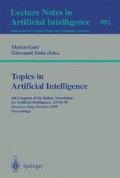Abstract
A traditional problem with best first search on hard problems is that space requirements are too large. However, space saving approaches require excessive time. We describe an approach which uses best first search, so as to keep time complexity low; it keeps space needs small because, through a statistical learning process, it builds accurate heuristics while solving problems. Unlike other search paradigms, solutions returned are accompanied with a statistical error assessment. In experiments solution quality is found high and time complexity is several orders of magnitude lower than competing techniques. The approach does not build a single heuristic for the whole domain. Instead, a new heuristic is built for each problem encountered: the learning time for constructing such “problem relevant” heuristics is low.
Deceased
Preview
Unable to display preview. Download preview PDF.
References
Bramanti-Gregor A., Davis H.W. and Ganschow F.G., Strengthening heuristics for lower cost optimal and near optimal solutions in A* search, Proceedings of the 10th European Conference on Artificial Intelligence (1992) 6–10.
Bramanti-Gregor A. and Davis H.W., The statistical learning or accurate heuristics, Proceedings of the 13th International Joint Conference on Artificial Intelligence (1993) 1079–1085.
Davis H.W. and Chenoweth S., The mathematical modeling of heuristics, Annals Of Mathematics and Artificial Intelligence 5 (1992) 191–228.
Korf R.E., Depth-first iterative-deepening: an optimal admissible tree search, Artificial Intelligence 27 (1985) 97–109.
Korf R.E., Linear-space best-first search: summary of results, Proceedings of the National Conference on Artificial Intelligence (1992).
Mero L., A heuristic search algorithm with modifiable estimate, Artificial Intelligence 23 (1984) 13–27.
Rendell L., Conceptual knowledge acquisition in search, in Computational Models of Learning, L. Bolc ed., Springer-Verlag (1987) 89–159.
Slagle J.E. and Farrel C.D., Experiments in automatic learning for a multipurpose heuristic program, Communications of the ACM 14 (1971) 91–99.
Vempaty N.R., Kumar V. and Korf R.E., Depth-first vs best-first search, Proceedings of the 9th National Conference on Artificial Intelligence (1991) 434–440.
Weisberg S., Applied Linear Regression, John Wiley & Sons, 1985.
Gregor A., Strengthening heuristic knowledge in A* search, Ph.D Dissertation, Dept. of Computer Science, Wright State University, Dayton, Ohio, USA (1993).
Author information
Authors and Affiliations
Editor information
Rights and permissions
Copyright information
© 1995 Springer-Verlag Berlin Heidelberg
About this paper
Cite this paper
Humphrey, T., Bramanti-Gregor, A., Davis, H.W. (1995). Learning while -Solving problems in single agent search: Preliminary results. In: Gori, M., Soda, G. (eds) Topics in Artificial Intelligence. AI*IA 1995. Lecture Notes in Computer Science, vol 992. Springer, Berlin, Heidelberg. https://doi.org/10.1007/3-540-60437-5_6
Download citation
DOI: https://doi.org/10.1007/3-540-60437-5_6
Published:
Publisher Name: Springer, Berlin, Heidelberg
Print ISBN: 978-3-540-60437-2
Online ISBN: 978-3-540-47468-5
eBook Packages: Springer Book Archive

